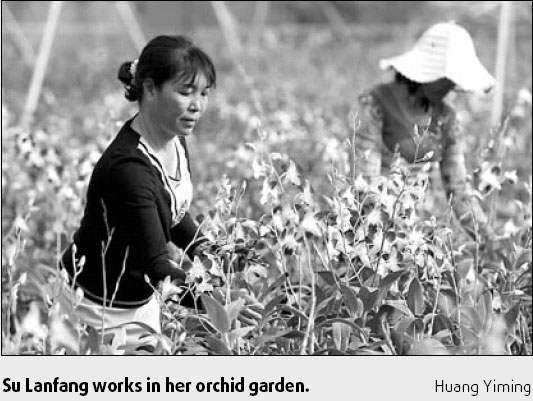Relocated villagers hope for a business bloom

For Su Lanfang life has been a series of ups and downs. Since the death of her husband, she has struggled to make a living for herself and three kids. She had to relocate along with other villagers and regularly battles against rain typhoons to keep her orchard afloat.
On the upside, after relocating, Su received a handsome payout, which enabled her to buy a 450 sq-m home where she lives with her youngest son.
However, despite her big house, plush couch and big television set, Su worries about what the future will hold. "These were difficult days," she says. "Most of us had nothing to do, and the ones like me were just hanging in there with a lame sense of hope."
Before their relocation, the 700 residents of her Longpo, or Dragon Hill village, all of Li ethnic group, had been living outside Sanya city for centuries, fishing and growing eucalyptus.
In 1995, Su's husband, a well-respected local school principal, died of cancer. She was 31 then, a widow with three school-age children, a sick father-in-law and plenty of debt. But Su worked hard, fishing and growing trees by herself. "I don't recollect much of those days, but I felt very happy when counting the cash," she says.
In only three years, Su managed to pay off all of her debts and build the family a 140 sq-m home. "My oldest son still always says he likes the old place better," Su says.
But when the entire village was asked to relocate in 2003 following a State-directed construction project, hers was only one of the more than 100 homes to be demolished. "It was a sacrifice we had to make for the State endeavor - I understand that," says Su, who was given a one-time 300,000-yuan ($42,774) resettlement fee by the government.
Like Su, most of those who received the payout spent the money on houses in their relocated village near Sanya city. Su spent 290,000 of the 300,000 yuan on her new home. "My daughter always scolds me for not saving some money for opening a Bed & Breakfast of some sort," Su says.
The remaining money was soon gone, and the villagers found themselves in well-furnished villas without a stable source of income: Their new surroundings had no eucalyptus, and being far from sea, there was nowhere to fish. Worse still, there were no fields to grow crops. Gradually, most working-age men migrated to Sanya and nearby towns for jobs. And for families like Su's with no male laborers, life was "half-urbanite, half-not - most older women would get together everyday on somebody's porch and ask the same old question: What do we do?"
The government then stepped in and suggested growing orchids as a possible solution. The county civil affairs bureau promised to deliver the seeds for free every August, dig wells for watering the flowers, and lobby for interest-free loans from the women's association of Sanya. While other villagers were hesitant due, Su, Longpo's elected female committee chief since 2003, decided to take the lead in August 2006.
With her cousin's help, Su borrowed 27 mu (1.8 hectares) of land from the village's neighboring elementary school and bought flowerpots, shelves, nets and fertilizers that cost them more than 100,000 yuan ($14,258). This is not including the time she and the cousin spend looking after the flowers - "dawn-till-dusk" is how she describes the workload.
Although the government does offer training, Su says she doesn't have time for the lessons and that she learns mostly from practice. "Although each pot of orchids can be cut between four to five times, the flowers are an especially finicky type: You can't raise them with too much sunlight, nor under too much shade, not to mention rains," she says. "We ought to disinfect all orchids after each rain. And the worst part of all is, they don't go well with tap water."
Some locals say that growing orchids is as difficult as raising children. So in order to be worth the effort, there must be an adequate financial return. For Su, that was a weekly income of 400 yuan, thanks to a Sanya hotel manager who orders and collects her flowers every Wednesday. Her total revenue in 2007 was some 30,000 yuan. "But my investment was more than that," she says.
"I'm glad the government has been there for us. The officials came up with the suggestion to grow orchids and have offered plenty of help.
"Typhoon blew away the shed's ceiling last October, and the government is just about to rebuild it for me. The 10,000-yuan interest-free loan from the Sanya women's association has also been a lifesaver.
"I'm still not making even, but I've been told this is normal in the first year or two. This is year three for me; I hope there is change soon."
(China Daily 04/10/2008 page18)














